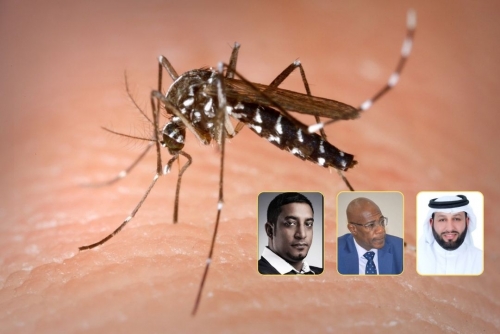Bahrain at Risk of Deadly Mosquito Species Due to Insufficient Preventive Measures
TDT | Manama
Email: mail@newsofbahrain.com
Khalid Bu Rshaid, a health pest control expert, has warned that Bahrain is at risk of the presence of dangerous mosquito species, including potentially deadly varieties.
He noted that the kingdom is home to approximately four types of these insects, which have become a major concern due to their association with diseases such as dengue fever, Zika virus, and malaria. This situation necessitates the implementation of effective preventive measures.
Bu Rshaid highlighted that Bahrain has experienced a significant increase in mosquito populations over the past few years, primarily due to the negligence of concerned authorities in taking crucial steps before the rainy season. He emphasised the need for intensified spraying campaigns in areas where water collects, as this has exacerbated the issue. He stressed that addressing this problem requires proactive measures ahead of the rainy season, which creates ideal conditions for mosquito breeding due to humidity and stagnant water.
He pointed out that the current rate of mosquito infestation cannot be compared to previous years, particularly noticeable during rainfall. Bu Rshaid underscored the importance of implementing effective strategies to limit the spread of these pests, such as improving drainage systems and eliminating stagnant water to ensure the health and safety of citizens. He called for immediate spraying of stagnant water in areas like Tubli Bay, Al Lawzi, and Al Buhair, where such water collections are a primary cause of mosquito proliferation.
Additionally, Bu Rshaid mentioned that favourable climatic conditions, such as rising temperatures and humidity, contribute to the breeding of these mosquito species, increasing the need for community awareness and education programmes on how to reduce associated risks.
Regarding effective solutions to combat mosquito infestations in homes, Bu Rshaid stated that incense, ultraviolet light traps, and window screens have proven effective in repelling mosquitoes. He noted, "It is impossible to completely eliminate mosquitoes, but we can reduce their spread. There are two types of mosquitoes: those that breed near damp surfaces and those that arrive from neighbouring countries via winds. We must tackle the mosquitoes that breed locally; otherwise, we will be unable to address the problem of those arriving from across borders."
Bou Rshaid emphasised the importance of collaboration between ministries and local authorities, urging a ramp-up of efforts in promoting personal and community hygiene and organising regular mosquito control campaigns. He encouraged citizens to report any water collections that could create suitable breeding environments for mosquitoes, stressing that prevention is the primary step in safeguarding public health.
Finally, he warned against the risks associated with mosquito bites, which can lead to unusual reactions on the body, adding, "It is essential to seek medical attention immediately if such symptoms arise."
For his part, Mubarak Faraj, a member of the Southern Municipal Council, said that the Kingdom initiated many special campaigns this year to combat mosquitoes, and we noticed their absence, unlike in previous years. Mubarak confirmed that the Kingdom this year exerted tangible efforts to control mosquitoes, which culminated in achieving tangible results.
Northern Municipal Council member Dr Salman Mohsen Abdullah agreed, confirming that the Ministry of Health and all concerned parties doubled their efforts this year to eliminate the mosquito problem. He affirmed that the ministry spared no effort in this regard this year."
Related Posts

